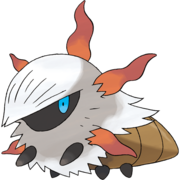From Bulbapedia, the community-driven Pokémon encyclopedia.
|
|
|
|
|
|
|
|
|
|
|
|
|
|
|
Height
3'07"
Imperial
|
1.1 m
Metric
|
3'07"/1.1 m
Red-Striped
|
0'0"/0.0 m
Blue-Striped
|
0'0"/0.0 m
|
|
|
Weight
63.5 lbs.
Imperial
|
28.8 kg
Metric
|
63.5 lbs./28.8 kg
Red-Striped
|
0.0 lbs./0.0 kg
Blue-Striped
|
0.0 lbs./0.0 kg
|
|
|
|
|
|
|
|
|
|
|
|
|
EV yield
HP
0
|
Atk
1
|
Def
0
|
Sp.Atk
0
|
Sp.Def
0
|
Speed
0
|
| Base Exp.: 72
|
Battle Exp.: 721*
|
|
|
|
|
Larvesta (Japanese: メラルバ Meraruba) is a dual-type Bug/Fire Pokémon introduced in Generation V.
It evolves into Volcarona starting at level 59.
Biology
Physiology
Larvesta is a fuzzy, moth larvae-like Pokémon. It has blue eyes in a shadowed face, and five orange, slightly whorled horns at the sides of its head. Its white mane of fuzz encompasses its head and the upper half of its body; its lower body is brown. It has three pairs of small black legs.
Gender differences
None.
Special abilities
Larvesta can spit fire from its five horns as a defensive tactic.
Behavior
Larvesta keep predators away by shooting fire from its horns.
Habitat
Larvesta live at the feet of volcanoes.
Diet
- Main article: Pokémon food
In the anime
Major appearances
Minor appearances
In the manga
In the TCG
- Main article: Larvesta (TCG)
Game data
Pokédex entries
| This Pokémon was unavailable prior to Generation V.
|
|
|
|
|
|
|
|
|
| Generation V
|
|
| Black
|
This Pokémon was believed to have been born from the sun. When it evolves, its entire body is engulfed in flames.
|
| White
|
The base of volcanoes is where they make their homes. They shoot fire from their five horns to repel attacking enemies.
|
| Black 2
|
{{{black2dex}}}
|
| White 2
|
{{{white2dex}}}
|
|
|
|
|
Game locations
| This Pokémon was unavailable prior to Generation V.
|
|
|
|
|
|
|
|
|
|
|
|
|
In side games
Held items
Stats
Base stats
| Stat
|
Range
|
| At Lv. 50
|
At Lv. 100
|
55
|
|
115 - 162
|
220 - 314
|
85
|
|
81 - 150
|
157 - 295
|
55
|
|
54 - 117
|
103 - 229
|
50
|
|
49 - 112
|
94 - 218
|
55
|
|
54 - 117
|
103 - 229
|
60
|
|
58 - 123
|
112 - 240
|
Total: 360
|
Other Pokémon with this total
|
- Minimum stats are calculated with 0 EVs, IVs of 0, and (if applicable) a hindering nature.
- Maximum stats are calculated with 252 EVs, IVs of 31, and (if applicable) a helpful nature.
|
Type effectiveness
| Under normal battle conditions in Generation V, this Pokémon is:
|
|
|
|
|
|
|
|
|
|
|
|
|
Learnset
|
|
|
|
- Bold indicates a move that gets STAB when used by Larvesta
- Italic indicates a move that gets STAB only when used by an Evolution of Larvesta
- Click on the generation numbers at the top to see level-up moves from other generations
|
|
|
| Game |
Move |
Type |
Cat. |
Pwr. |
Acc. |
PP
|
| This Pokémon learns no moves by tutoring.
|
- A black abbreviation in a colored box indicates that Larvesta can be tutored the move in that game
- A colored abbreviation in a white box indicates that Larvesta cannot be tutored the move in that game
- Bold indicates a move that gets STAB when used by Larvesta
- Italic indicates a move that gets STAB only when used by an Evolution of Larvesta
|
Special moves
TCG-only moves
Side game data
Evolution
Sprites
Trivia
- Out of all Pokémon that evolve by a set level, Larvesta evolves later than any other Pokémon who have not yet evolved, at level 59.
- No other Pokémon has the same type combination as Larvesta and its evolution.
- Larvesta is the last Pokémon in the National Pokédex that evolves into another Pokémon.
- Larvesta learns a new move every ten levels. It would share this trait with its evolved form, but Volcarona also learns Quiver Dance at level 59.
- For reasons unknown, Larvesta and Volcarona cannot learn Attract, despite having genders and being compatible with other TMs. They share this trait with Nincada, although Nincada's inability to learn the move is likely due to a desire to keep the genderless Shedinja from learning it.
Origin
Larvesta is based on a Moth and Tower of the Sun. Larvesta appears to be based on an Atlas moth larva. The way its red growths are shaped and positioned on its circular body may be a reference to the sun.
Name origin
Larvesta's name is derived from "larva", a term for an infant insect, and "Vesta", an Ancient Roman fire goddess.
Meraruba may derive from "meramera" (flare), and "larva".
In other languages
External links
Notes

|
This Pokémon article is part of Project Pokédex, a Bulbapedia project that aims to write comprehensive articles on each Pokémon species, as well as Pokémon groups and forms.
|













































